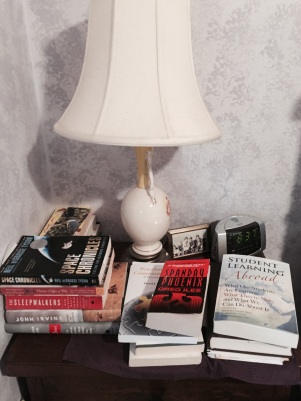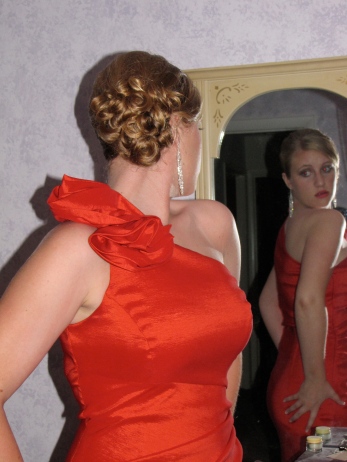 “We do not learn from experience…we learn from reflecting on experience.”–John Dewey
“We do not learn from experience…we learn from reflecting on experience.”–John Dewey
I like to read and I’m collector of books. I’d much rather buy a book than borrow it from the library or use an e-reader. My nightstand is covered with books–some that I’m in the processing of reading , a few that I’ve finished, and several that I haven’t gotten to yet. The book on the far right of the picture, Student Learning Abroad:What Our Students Are Learning, What They’re Not, and What We Can Do About It , is one I’m reading for work. I haven’t finished it yet, but I’ve read several of the chapters in random order. So far my take away is that, although students report that studying abroad is a life-changing, transformative experience, in terms of cultural compentencies, the gain is minimal for most students, even those in immersive programs. The students who improved their cultural competencies, as measured by the Intercultural Development Index (IDI), were in programs that included guided and targeted reflection on their experience before, during, and after their semester or year abroad. The authors postulate that the experience alone is not enough. Students need to reflect on the experience, write about it, talk about it, and analyze critical incidents–things like misunderstandings, conflicts, negative feelings, or other defining moments. Determine what when wrong, how their reaction affect the situation and outcome, and what they could have done differently. That’s how you learn and grow.
, a few that I’ve finished, and several that I haven’t gotten to yet. The book on the far right of the picture, Student Learning Abroad:What Our Students Are Learning, What They’re Not, and What We Can Do About It , is one I’m reading for work. I haven’t finished it yet, but I’ve read several of the chapters in random order. So far my take away is that, although students report that studying abroad is a life-changing, transformative experience, in terms of cultural compentencies, the gain is minimal for most students, even those in immersive programs. The students who improved their cultural competencies, as measured by the Intercultural Development Index (IDI), were in programs that included guided and targeted reflection on their experience before, during, and after their semester or year abroad. The authors postulate that the experience alone is not enough. Students need to reflect on the experience, write about it, talk about it, and analyze critical incidents–things like misunderstandings, conflicts, negative feelings, or other defining moments. Determine what when wrong, how their reaction affect the situation and outcome, and what they could have done differently. That’s how you learn and grow.
 The findings in Student Learning Abroad in no way discount the claim that students make when they return from studying abroad. It is life-changing and transformative. Students do learn a lot about themselves and their host country. They gain valuable skills such as problem solving. Anyone who had tried to navigate a transportation system or do laundry in a foreign country can attest to that. However, the experience abroad has the potential to be much more valuable if guided and targeted reflection is part of the program.
The findings in Student Learning Abroad in no way discount the claim that students make when they return from studying abroad. It is life-changing and transformative. Students do learn a lot about themselves and their host country. They gain valuable skills such as problem solving. Anyone who had tried to navigate a transportation system or do laundry in a foreign country can attest to that. However, the experience abroad has the potential to be much more valuable if guided and targeted reflection is part of the program.
Reflecting can be an uncomfortable process. It’s not easy to admit that you bear at least some responsibility during one of the those critical incidents. We tend to judge others without knowing what is going on inside them. Often those judgments are made based on our own cultural biases that we aren’t even aware that we possess. And then we act or react according to those judgements. How often does that lead to conflict? Probably more times than we care to admit. If we reflect honestly on those experiences and look at them through a more nuanced lens, we can learn how to better handle handle similar situations in the future.

I loved this post. I agree with you, it is through the reflection on one’s experiences… and introspection … that real learning takes place. Without these, cartloads of experience are but meaningless.
LikeLiked by 1 person
And yes, the pictures are nice too.
LikeLiked by 1 person
Thanks! I’m glad you liked the post and the pictures.
LikeLike
I am currently studying abroad in Thailand and love this!! Thank you for writing.
LikeLiked by 1 person
That’s great! Enjoy your time there!
LikeLike